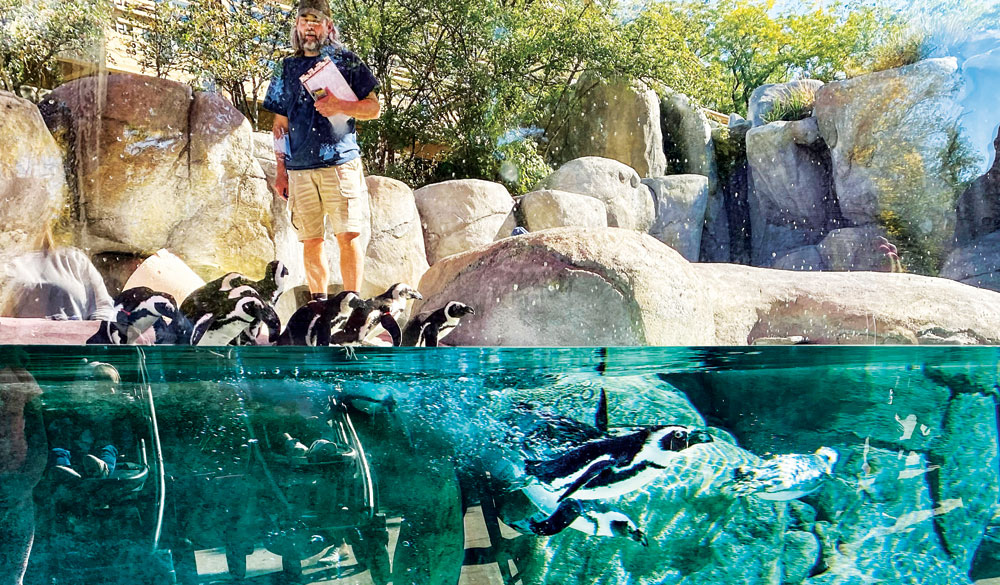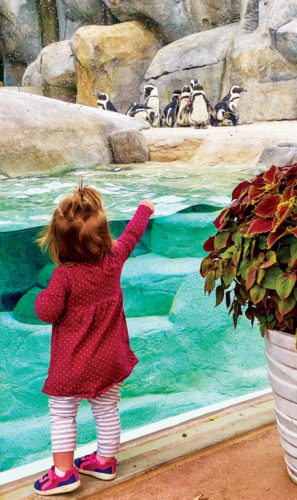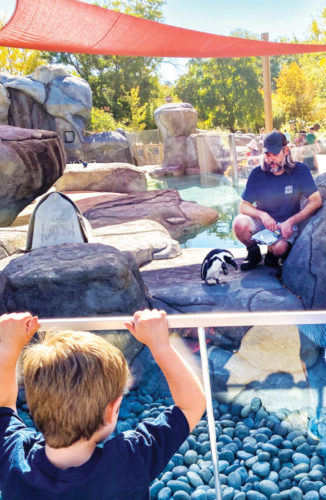
Zookeeper Travis Garrett assists the Denver Zoo’s African Penguin colony to get acclimated to their new habitat, opened to the public on September 30, 2021. The colony consists of 17 penguins. Next year the staff hopes to expand the colony, either through breeding or acquisition, to its full capacity of 25 birds.

A young zoo-goer is just tall enough to peer above the waterline. The penguin’s new enclosure includes a rocky beach and a 40-foot,10,000-gallon wave pool that provides the public with three-and-half feet of underwater viewing.
Seventeen penguins have a new home at the Denver Zoo. The African Penguin has been part of the zoo’s menagerie since the opening of Bird World in 1975. But with the now-defunct enclosure slated for demolition next year, the colony needed a new place to call home. “We transformed part of Predator Ridge—which was housing African mongoose, porcupine, and a small antelope called Dik Dik—into a state-of-the-art penguin habitat.” says John Azua, Head of the Bird Department. The new exhibit, called Pinnacol African Penguin Point, was modeled after Boulder Beach in South Africa where colonies of endangered African penguins currently live.
“The exhibit is broken into two parts,” says Azua. “The west side features a 40-foot, 10,000-gallon wave pool with a state-of-the-art life-support system which includes two five-horsepower centrifugal pumps and four high-rate sand filters that circulate the water before it passes through either a chiller or heat pump to regulate temperature. The pool provides three and half feet of underwater viewing. Penguins will jump out of the water like dolphins; it’s called porpoising, and the new exhibit provides a great opportunity to see one or two or the entire colony go for a swim,” says Azua. “The east side is a dry land sand exhibit. It’s really dynamic and tranquil. The birds are happy and adapting nicely to their new surroundings.”
Azua says the current goal is to help the colony, which ranges in ages from two to 30, to fully acclimate to its new habitat. But eventually they’d like to increase the population, which was born entirely in captivity, to 25 birds. “We have 40 years of successful African Penguin breeding,” says Azua. “And beginning in 2022, we’d like to set the colony up for breeding, so we can acquire eight more birds either through reproduction or acquisition from other zoos.”

Maggie, a super-friendly member of the African colony, gets close to Zookeeper Travis Garrett. Maggie became accustomed to humans since she was hand-fed and taken home at night after her parents abandoned her to take care of a sibling.
Other goals include continuing their conservation work. “There are about 500 African Penguins in North America,” says Azua. “They’re part of a Species Survival Plan under the American Zoo Association. Part of our work is sending staff to Cape Town, South Africa to help with a rehabilitation organization called The Southern African Foundation for Conservation of Coastal Birds (SANCCOB). Our team will rehabilitate abandoned African Penguin chicks and release them back to Boulder Beach or other natural habitats,” says Azua. “Penguin parents may abandon their chicks for several reasons. Inexperienced pairs or pairs at the end of their breeding season may abandon a chick. Albatrosses, crows, and other avian species may stress out inexperienced parents, causing them to leave; and like so many coastal species, penguins like to nest where humans are, which can cause stress and abandonment. Nursing an abandoned chick back to health so it’s capable of being released back into nature can take months,” says Azua. To learn more visit https://denverzoo.org/zootales/new-penguin-exhibit/.
Front Porch photos by Christie Gosch




0 Comments